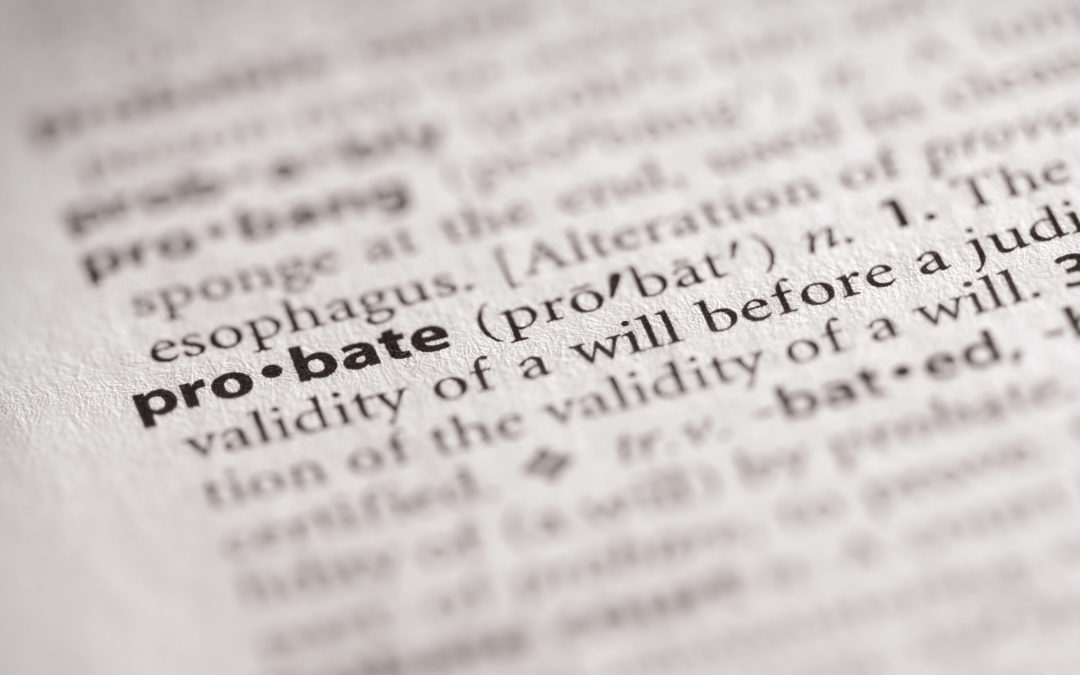Many clients consult their estate planning attorneys with one of their goals being to avoid probate, usually because a family member suggested it. You may have heard horror stories of friends or family dealing with probate of family members’ estates for years. One of the fields my office concentrates in is Probate Law, or Estate Administration, and indeed, much of estate planning involves avoiding probate.
So, what is Probate? Probate of an estate is basically a legal process for handling the final affairs of a person after he or she passes. These affairs include the paying final debts and the transfer of property or assets. Probate is not always necessary, but leaving a will does not necessarily avoid probate. “Property” includes “real property” (real estate or homes), as well as “personal property” like furniture, antiques, and vehicles. Not all property has to go through the probate process. Finally, there are less formal procedures for this process, and strategies for avoiding the probate process altogether.
Wills. First, probate may be required whether a person passes leaving a Will or not. Persons leaving a valid will are said to die “testate,” meaning the person has spelled out her intentions or wishes for the handling of her affairs and the distribution of her estate. Those wishes are generally respected by the law. A person passing without a valid will, or whose will is lost, is said to die “intestate.” The affairs of an intestate person are generally governed by state and local laws. In either situation, a court procedure may be required to grant someone the authority to handle these affairs, and for the court to “sign off” on it.
Affairs. How are a person’s affairs handled? The probate process is designed to determine whether a valid will exists, what assets and debts exist, and who is entitled to any assets remaining after the debts are accounted for. A person, usually the Personal Representative designated in the will or a family member when there isn’t one, will “open the estate” and be authorized by the court to represent the estate and handle matters. This authorization may require court supervision, depending on several factors – because of this, representation by an attorney is advisable, and sometimes required. The Personal Representative is placed in charge of filing the will with the court, and collecting information on surviving family members, assets, and debts (or claims). The Personal Representative then files an accounting of the assets and claims to the court. Valid and timely presented claims generally must be paid out of the estate, and some assets may be sold to pay these claims. Eventually, the Personal Representative is authorized to deliver the remaining assets (or the proceeds from their sale) to the relatives entitled to them, and the estate may be closed.
Property. While probate is designed to account for and take care of all of a person’s belongings and affairs, not all property must go through probate. Many assets transfer automatically when an owner passes away, such as jointly titled homes (known as “joint tenancy with rights of survivorship”), such as by a married couple. Bank accounts and vehicles may also be jointly titled. Other assets may be titled as “transfer on death” which allows much the same to happen without the joint control while the owner is living. Still other assets are designed to transfer to specified beneficiaries at death, like life insurance or certain retirement accounts.
Probate limit. Why is it important to know which assets are subject to probate? Because not all estates must go through the formal probate process. Indiana law generally does not require the formal probate of an estate with less than $50,000 in probate assets – the automatic transfers described above generally do not count toward that limit. Thus, if the value of the “probate property” left behind is less than this amount, a less formal procedure may be followed for the transfer of assets and payment of claims.
Avoiding probate. The probate process is a fairly public process, requiring the recording of the will, and notification of creditors, among other requirements. Probate also can involve contesting of a will – where people may claim to be entitled to assets not left to them. Probate also often requires representation by an attorney, and expected fees. Because of these aspects, taking steps to avoid probate may save time and money in the long run, as well as provide some privacy. Because of the value limits and categories described above, there are several strategies to avoid the expense of formal probate. Some of the more common strategies include appropriate titling of assets, including payment on death (POD) accounts, and especially the use of living trusts.
If avoiding timeline, expense, and public nature of the probate process are priorities, it would be advisable to discuss these goals with an estate planning attorney. If a family member has passed and the estate hasn’t been settled out, an attorney discussion on options would also be an important first step. Our office is certainly here to help you to accomplish those goals.

